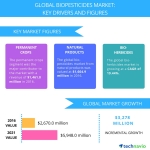Global Biopesticides Market – Drivers and Forecasts by Technavio
LONDON–(BUSINESS WIRE)–#AgrochemicalsandFertilizers—Technavio
analysts forecast the global
biopesticides market to grow at a CAGR of more than 17%
during the forecast period, according to their latest report.
The research study covers the present scenario and growth prospects of
the global
biopesticides market for 2017-2021. The market is segmented
based on product (bioherbicides, biofungicides, bioinsecticides,
and bionematicides) and geography (North America, Europe, APAC, Latin
America, and ROW)
The global biopesticides market is expected to grow with the increasing
worldwide population, which will lead to a higher demand for food. Also,
the rising awareness of the benefits of organic products, especially
among the rapidly growing younger generation in emerging economies, will
have a positive impact on the growth of the market. More crop
cultivation by farmers will drive the requirement of more biopesticide.
Increasing population and urbanization are the two main factors that
intensify the competition among manufacturers and at the same time pave
the way for more players to enter the market.
This report is available at a USD 1,000 discount for a limited time
only: View
market snapshot before purchasing
Buy 1 Technavio report and get the second for 50% off. Buy 2
Technavio reports and get the third for free.
Technavio chemicals
and materials research analysts highlight the following three
factors that are contributing to the growth of the global biopesticides
market:
- Increase in pest activities due to global warming
- Improved biological pest control methods
- Demand for organic products
Looking for more information on this market? Request
a free sample report
Technavio’s sample reports are free of charge and contain multiple
sections of the report including the market size and forecast, drivers,
challenges, trends, and more.
Increase in pest activities due to global warming
An increase in carbon dioxide (CO2) concentrations increase simple
sugars present in leaves and even reduces the nitrogen content. These
changes in the environment can increase the damage caused by insects
that consume more number of leaves just to meet their metabolic
requirements of nitrogen. Higher temperatures due to global warming can
provide suitable conditions for pests to survive the winter season.
Kurva Samba Sivudu, a lead agrochemicals
and fertilizers research analyst at Technavio, says, “Global
warming and climatic changes have drastic effects at various levels, for
example, they increase the geographical spread of pests and pathogens,
new species in cooler regions, increased risks by migration of pests,
reduction in effectiveness of crop protection technologies, and a higher
probability of developing pest resistance. These adverse effects are
driving the demand for biopesticides that can adapt to changing climatic
conditions easily and can sustain changes more often.”
Improved biological pest control methods
Botanical pesticides are chemicals that are derived from plants and are
used in similar ways as conventional pesticides. They can occur
naturally like pyrethroids from chrysanthemum flowers or can be
synthesized like nicotine from tobacco. Naturally occurring botanicals
are more popular because of their natural sources.
“Insect growth regulators are chemicals that affect insect growth and
are available as naturally occurring hormones or synthesized compounds.
Insects follow a phenomenon of shedding and growing outer layers of
their skin through a process called molting. IGRs interfere with this
molting process. Even though mammals exhibit low toxic levels to these
insecticides, they affect crabs, shrimps, and other molting animals.
However, non-targeted impacts have raised concerns leading to strict
regulations on the usage of IGRs,” adds Kurva.
Demand for organic products
Rising health concerns and increasing awareness of the health benefits
of organic food are enhancing the growth of the global biopesticides
market. The increase in income levels leading to better standards of
living and government initiatives are other factors driving this
market’s growth. Consumer behavior has shifted toward health
consciousness resulting in the change of preferences and tastes.
Organic food is produced using reusable resources that limit the use of
harmful pesticides and chemicals in food products. It is usually
observed that organic farming is practiced in small, family-run farms,
where utmost importance is dedicated to the quality of soil and water
ensuring fertile lands even for future generations. Crop rotation is
another farming technique followed to retain soil fertility. This form
of farming lowers the toxic load on the environment. These factors are
influencing government authorities to fund organic farming practices and
are even attracting many private players into this field.
Top vendors:
- BASF
- Bayer
- DuPont
- Novozymes
- Sumitomo Chemical
Browse Related Reports:
-
Global
Water Soluble Fertilizers Market 2016-2020 -
Global
Organic Trace Minerals for the Animal Feed Market 2016-2020 -
Global
Seed Treatment Market 2016-2020
About Technavio
Technavio
is a leading global technology research and advisory company. Their
research and analysis focuses on emerging market trends and provides
actionable insights to help businesses identify market opportunities and
develop effective strategies to optimize their market positions.
With over 500 specialized analysts, Technavio’s report library consists
of more than 10,000 reports and counting, covering 800 technologies,
spanning across 50 countries. Their client base consists of enterprises
of all sizes, including more than 100 Fortune 500 companies. This
growing client base relies on Technavio’s comprehensive coverage,
extensive research, and actionable market insights to identify
opportunities in existing and potential markets and assess their
competitive positions within changing market scenarios.
If you are interested in more information, please contact our media team
at media@technavio.com.
Contacts
Technavio Research
Jesse Maida
Media & Marketing Executive
US:
+1 630 333 9501
UK: +44 208 123 1770
www.technavio.com










